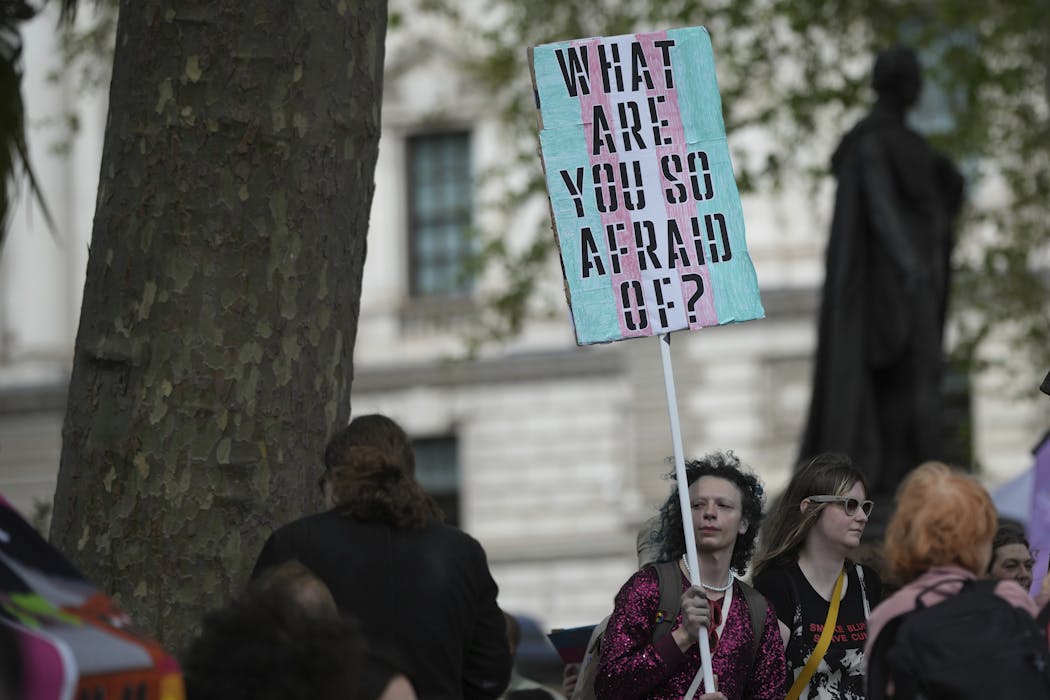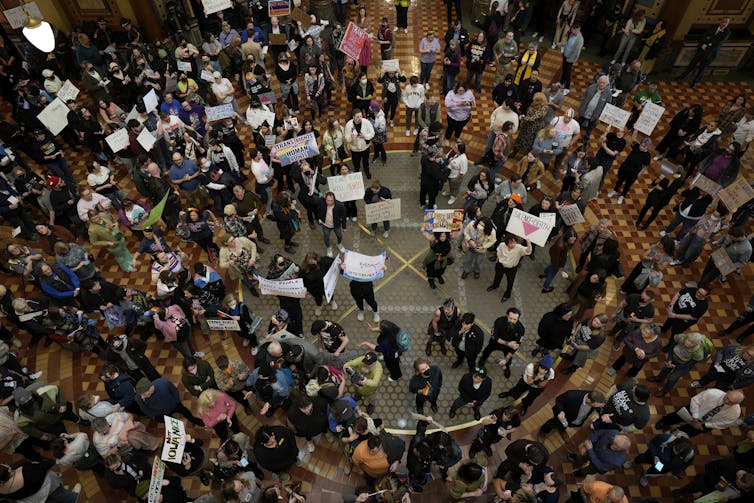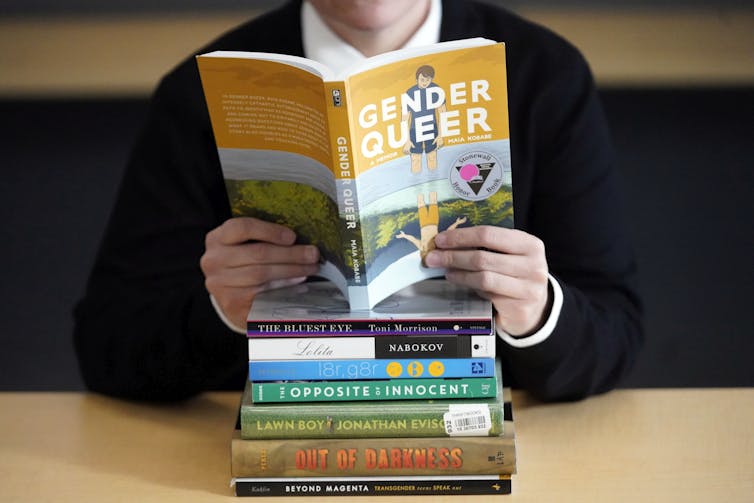Gender is not an ideology – but conservative groups know learning about it empowers people to think
From book bans and firing teachers to taking over university administrations altogether, right-wing politicians and activists worldwide have been keen on rooting out gender from schools. Why is that?

Political attacks on teaching about gender in colleges and universities are about more than just gender: They are part of a grander project of eroding civil and human rights, limiting personal freedoms and undermining democracy in the name of “traditional” values.
On the first day of his second term, President Donald Trump issued an executive order declaring there are two sexes determined solely by the kind of reproductive cells the body makes, and that the federal government would recognize nothing else. The order claims to protect the “freedom to express the binary nature of sex” and bans the use of federal funds to “promote gender ideology.” Legal experts have criticized the directive as unconstitutional and are challenging it in the courts.
Yet the order has provided fuel for conservatives, right-wing politicians and activists trying to remove so-called gender ideology from many places in American society, including classrooms. Right-wing activists are pushing for censorship of educational curricula in K-12 schools and in colleges and universities, and they have succeeded in Texas, Florida and other red states.
Why are conservative politicians so determined to control how Americans define sex and understand gender?
As sociologists who research and teach about gender, we know that gender across disciplines is understood to be a complex topic of study, not an ideology. The study of gender represents the kind of free inquiry that allows people to decide for themselves how to live, free of coercion or government control.
What is ‘gender ideology’?
“Gender ideology” is a catch-all term conservative Catholics initially promoted in the 1990s in response to the United Nations’ promotion of women’s equality.
In 2004, pushing back on the global women’s and gay rights movements, the Vatican declared in a letter to bishops that men and women are different by nature “not only on the physical level, but also on the psychological and spiritual.” The letter stated that the idea of gender “inspired ideologies” that sanction alternatives to the traditional two-parent family headed by men and treated homosexuality on par with heterosexuality.
Over the following decades, evangelical groups and far-right parties across the globe – from Hungary and Russia to Peru, Brazil and Ghana – have used the language of combating “gender ideology” to counter a host of social policies, including sex education in schools, the legalization of gay marriage and same-sex adoption, reproductive rights and transgender rights.

The anti-gender movement is no longer fringe but rather well funded, organized and transnational. For example, 40 countries have signed the Geneva Consensus Declaration, an international pact proposed by the first Trump administration and supported by anti-gender campaigners as a way to deny abortion rights internationally.
In the U.S., where the majority of Americans support gay marriage and abortion rights, targeting trans rights has become one of the conservative movement’s galvanizing issues. A flood of state bills not only ban books and discussions of gender, sexuality and race in schools but also criminalize abortion, ban gender-affirming health care and legalize discrimination in housing and employment on religious grounds.
What we talk about when we talk about gender
How gender is researched and taught in universities has become a key target of anti-gender campaigns across the globe, in part because the study of gender raises questions about the universality of traditional social roles and the inequalities that can result from them.
Gender is a focus of inquiry not only in gender studies classes but in literature, sociology, law, government, history, anthropology and cultural geography, among many other fields.
Anti-gender campaigners argue there is nothing to understand about it because gender is given by nature or God. For them, gender is equivalent to sex, which is taken to be straightforward and without exception male or female.
Scientific evidence suggests, however, that sex is not always binary. In biology, sex refers to genes, reproductive organs, hormone systems and observable physical characteristics; different combinations of these lead to variations in sex. Far from straightforward, then, sex is complicated.
And a person’s assigned sex at birth does not always align with their deeply held sense of self – their gender identity.
Gender is both a feature of individual people and a mode of organizing social life. At the individual level, people have a subjective sense of and embody their gender by dressing and behaving in ways that encourage other people to see them as they want to be seen. A man might wear a tie at the office to convey masculinity. People will interact differently with a woman when she is wearing high heels and makeup than when she goes barefaced or dons a swimsuit. Someone who is gender fluid may appear more masculine or feminine at different times and experience prejudice and discrimination.
Gender shapes societies through norms and rules on everything from what you wear to how families operate, whom you are allowed to partner with and what jobs you are likely to hold. Whether in the spheres of culture, family, economic or civic life, gender roles and norms intersect with class, race and other social differences and shift across cultures and historical eras. Indigenous societies across the globe have long recognized more than two gender categories, and historical and contemporary examples of gender diversity abound.
A ban on learning about gender would sweep aside all this variation in favor of a homogeneous worldview that deliberately ignores biology, history and lived experience. Denying the diversity of gender makes it easier to impose a conservative worldview and roll back rights.
Education as a political target
Anti-gender campaigners view education as a major battleground in the fight over societal values. In the U.S., conservative efforts to ban the study of gender and sexuality initially centered on K-12 education, exemplified in bills such as Florida’s 2022 “Don’t Say Gay” law. But the movement has also affected colleges and universities.
Texas A&M’s president fired a professor in September 2025 after a student recorded her confrontation with her for discussing gender diversity in a literature course. The student alleged the course was “not legal” because it contradicted “our president’s laws” and her own religious beliefs. The university president also later resigned under pressure.
The same month, the chancellor of the Texas Tech University system, citing Trump’s executive order on “gender ideology,” banned all faculty members across its five universities from recognizing “more than two sexes” in any course or classroom.

As the Texas chapter of the American Association of University Professors reminds its members, faculty have a constitutional right to teach and discuss “all matters related to the subject matter of a class” without interference from administrators, politicians or government officials. Despite this, states led by conservative lawmakers have used a range of tactics to eliminate gender studies programs or curriculum from colleges.
These attacks on universities are attempts to control thought, subdue social movements advocating for change and promote an orthodoxy that upholds those in power.

Restricting rights, eroding democracy
These attacks on education are not only academic matters. They disempower women and marginalized groups that have achieved some legal protection or rights in recent decades. And they contribute to the erosion of democracy.
Authoritarian approaches to governing rely on scapegoating people, policing thought and speech, and punishing dissent. This is true whether it’s Viktor Orban’s Hungary, Vladimir Putin’s Russia or Donald Trump’s United States. By prohibiting questions and challenges, autocrats gain the power to limit how people think and control their bodies.
Victoria Pitts-Taylor is a member of the American Association of University Professors and the National Women's Studies Association.
Elizabeth Anne Wood a senior strategist with the Woodhull Freedom Foundation. This is a volunteer position.
Read These Next
Trump says climate change doesn’t endanger public health – evidence shows it does, from extreme heat
Climate change is making people sicker and more vulnerable to disease. Erasing the federal endangerment…
FDA rejects Moderna’s mRNA flu vaccine application - for reasons with no basis in the law
The move signals an escalation in the agency’s efforts to interfere with established procedures for…
Nearly every state in the US has dyslexia laws – but our research shows limited change for strugglin
Dyslexia laws are now nearly universal across the US. But the data shows that passing a law is not the…





